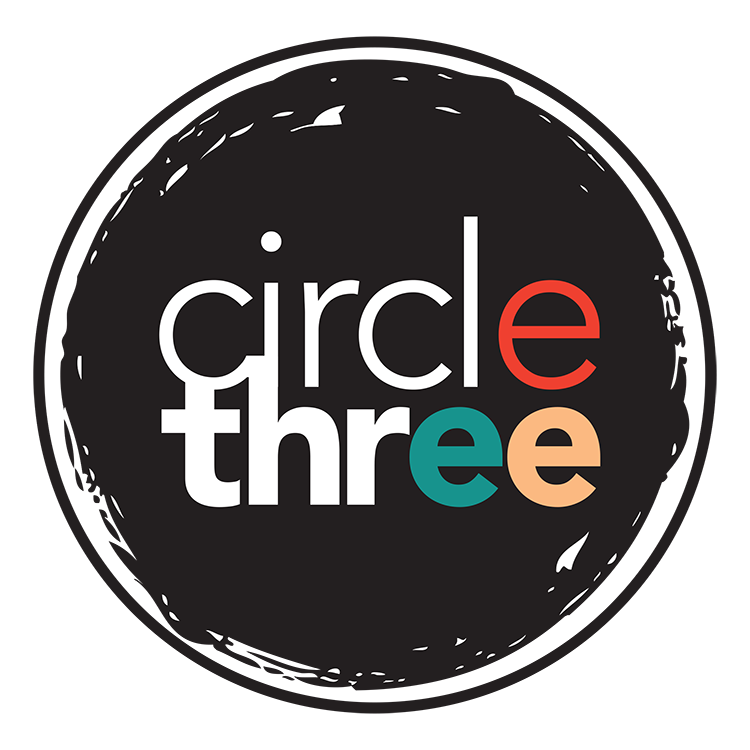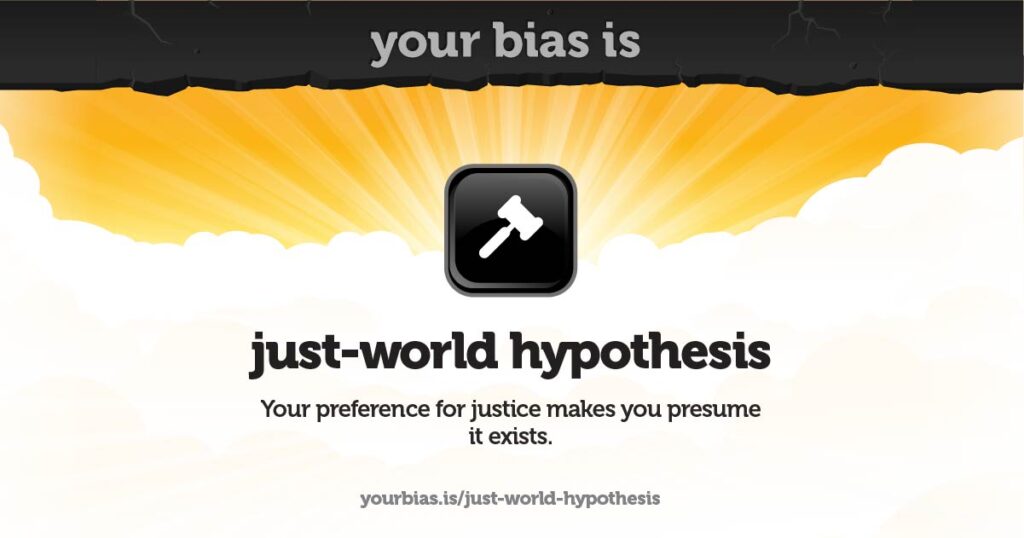This is one part in a series on Cognitive Biases and Logical Fallacies in marketing. Read more here.
The just world hypothesis is a cognitive bias that revolves around the belief that people get what they deserve and deserve what they get. It suggests that individuals tend to think that the world is fundamentally fair and that actions and events lead to fair and fitting consequences.
This bias can manifest in various ways:
- Blaming the victim: When something negative happens to someone, individuals may rationalize it by assuming the person must have done something to bring it upon themselves. For instance, blaming a person who has been a victim of a crime by suggesting they must have done something to provoke it.
- Belief in a just order: It involves a faith in the notion that the world has a way of restoring balance, so if someone is successful, they must have worked hard for it, and if someone is suffering, they must deserve it due to their actions.
- Psychological discomfort avoidance: Embracing the just world hypothesis can help individuals reduce their anxiety about the uncertainties and injustices in the world. Believing in a just world provides a sense of security and control.
This bias can be seen as a coping mechanism to deal with the complexity and randomness of life events. It helps individuals maintain a sense of predictability and control in a world that might otherwise seem chaotic and unpredictable. However, it can lead to victim-blaming and a lack of empathy toward those who are suffering, as it overlooks the numerous factors that contribute to life circumstances beyond individual control.
Just World Hypothesis in Business
The just world hypothesis can significantly influence business decisions, particularly in marketing strategies and consumer behavior analysis:
- Product Success and Failure: Marketers might attribute the success or failure of a product to the perceived deservingness of the brand or company. If a product fails, there might be a tendency to assume that the market rejected it because it didn’t deserve success, rather than considering other factors like market saturation, timing, or competition.
- Brand Image and Reputation: Companies often work on building their brand image to convey values such as hard work, quality, and reliability. The just world hypothesis can influence consumers’ perceptions—believing that successful brands must have deserved their success through their efforts and superior products/services.
- Consumer Behavior and Purchasing Decisions: Consumers might justify their buying choices based on the just world hypothesis. For instance, they might believe that purchasing a certain luxury item is justified because they’ve worked hard and deserve the reward.
- Marketing Campaigns and Messaging: Advertisements often tap into the just world hypothesis, emphasizing narratives where hard work leads to success or using language that implies deservingness. This strategy aims to connect with consumers’ beliefs and values, fostering a sense of deservingness associated with the product or service being offered.
- Handling Consumer Complaints or Issues: In customer service or public relations, the just world hypothesis might influence how companies address complaints. There could be a tendency to attribute consumer issues or complaints to their own actions or deservingness rather than acknowledging faults in the product or service.
Understanding and leveraging the just world hypothesis in marketing can help companies tailor their messaging, branding, and product positioning to align with consumers’ beliefs about deservingness and success. However, it’s essential to balance this with empathy and a recognition of the multiple factors that contribute to business outcomes, as solely relying on this bias may lead to overlooking genuine issues or challenges faced by consumers or the market.
Let’s Fix It
To address the influence of the just world hypothesis in marketing waste, recycling, and sustainability services, companies can employ several strategies:
- Education and Awareness Campaigns: Start by educating consumers about the complexities of waste management and recycling. Highlight the systemic challenges and how individual actions, while important, may not solely dictate outcomes. Explain the broader impact of policies, infrastructure, and industry practices.
- Transparency in Communication: Be transparent about the limitations and challenges within the waste and recycling industry. Acknowledge that while individual actions matter, systemic changes and collective efforts are crucial for significant progress toward sustainability.
- Highlight Collective Impact: Emphasize the collective impact of communities or groups working together toward sustainability. Showcase success stories where communities, businesses, and governments collaborate for more effective waste management and recycling initiatives.
- Focus on Solutions and Innovation: Instead of solely emphasizing blame or responsibility, focus marketing efforts on solutions and innovations. Highlight advancements in technology, circular economy practices, and initiatives that make recycling and waste management more accessible and efficient.
- Empowerment and Positive Messaging: Frame messages to empower consumers. Instead of guilt or blame, inspire action by showing how even small changes collectively contribute to positive outcomes. Encourage consumers to be part of the solution without attributing blame for existing issues.
- Engage in Collaborative Initiatives: Partner with NGOs, local communities, or educational institutions to run campaigns or workshops that provide comprehensive knowledge about waste management and sustainable practices.
- Customer-Centric Approach: Tailor marketing to resonate with consumers’ values. Highlight how using sustainable services aligns with their desire to make a positive impact on the environment and society.
- Measurement and Reporting: Provide transparent reporting on the impact of recycling and waste management efforts. Show metrics and data to demonstrate the effectiveness of these initiatives beyond individual actions.
By implementing these strategies, companies can help mitigate the effects of the just world hypothesis in their marketing efforts related to waste, recycling, and sustainability. This approach encourages a more holistic understanding of the issues and promotes collective responsibility and action.
Interested in Learning More?
We’ll cover more cognitive biases and logical fallacies in upcoming blog posts, but if you’re eager to learn more and access free resources, check out School of Thought. If you’re interested in see how Circle Three Branding applies these to your marketing strategy, contact us.

